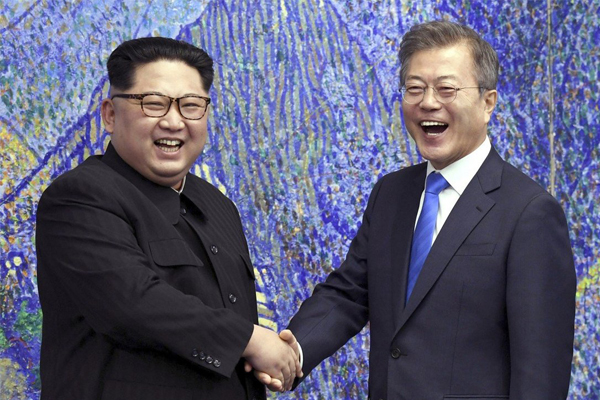- Demands for negotiations on a treaty are part of a bill in the US Congress that ignores North Korean human rights violations and its nuclear missile programme
- Those pushing for a treaty assume all sides must agree first to ending the Korean war, which North Korea shows no interest in doing
The end of the US adventure in Afghanistan leads right away to consideration of the much longer US involvement in Korea.
A legion of critics of the American “empire”, as they sometimes call the global network of US bases and treaty arrangements, like to say the United States is still waging war on the Korean peninsula – even if no one is firing any of the thousands of weapons poised on both sides of the demilitarised zone that has divided North and South Korea since the signing of the Korean war armistice in July 1953.
The basis for the claim that the Korean war remains unfinished is that the armistice signed by generals from the US, China and North Korea – but not South Korea – never morphed into a formal peace treaty as originally intended.
The fact that South Korea’s first president, Syngman Rhee, refused to join the negotiations – wanting nothing to do with a deal that would bring about a permanent division of the Korean peninsula – adds to the argument that now is the time for the US and South Korea to come to terms on a treaty with the North.
The bill was sponsored initially by California Representative Brad Sherman and is now co-sponsored by three others. It will be the focal point of hearings by the House of Representatives’ Foreign Affairs Committee, of which Sherman is the senior member.
It includes two other crucial provisions – for setting up liaison offices with North Korea and authorising US citizens to visit the North. This has been forbidden since the death in 2017 of Otto Warmbier, the student who was convicted, jailed and returned in a comatose state to the US, where he died several days later.
Two of the bill’s cosponsors, New Jersey’s Andy Kim and New York’s Grace Meng, have pushed for exceptions on the travel ban, particularly for Korean-Americans with roots in the North who want to go there for “funerals, burials or other religious or family commemorations”.
The bill’s sponsors make no mention of the case of Warmbier, who was jailed for 15 months for pilfering a sign from his Pyongyang hotel the night before he was to go home after a brief visit.
More importantly, the bill says nothing about the biggest threat to peace on the peninsula – North Korea’s nuclear and missile programmes. The assumption of those campaigning for a treaty is that all sides must first agree to ending the Korean war.
That is absurd, of course. North Korea would demand as conditions for any treaty that the US and United Nations withdraw sanctions against it and that the US closes bases in the South, including Camp Humphreys south of Seoul, where most of the 28,500 US troops are concentrated.
The US and South Korea would also have to abrogate the alliance that has endured since US forces under the aegis of a hastily established UN Command, including relatively small forces from several other countries, rescued the South from North Korean invasion in June 1950.
It’s no doubt because North Korean leader Kim Jong-un would stick to these demands that he so far appears uninterested in a treaty. He knows talks will go nowhere while US President Joe Biden strongly affirms the alliance with the South.
Advocates of a treaty, however, count on South Korean President Moon Jae-in – who is anxious to renew dialogue with the North and leave a legacy of North-South amity and perhaps reunification when he steps down next year – to support their efforts. Moon has frequently called for an end-of-war agreement, a relatively toothless step on the way to a treaty.
The whole idea is anathema to Grant Newsham, a retired US Marine officer and frequent commentator on Korean issues. He fears members of Congress are being blindsided with no real understanding of how a treaty would play into North Korea’s policy goals.
“The measures included in this bill are best viewed as steps in a broader, ongoing effort [to get the Americans out],” he says, after which war between North and South Korea “will be inevitable”. He believes “a range of actors would like to see that happen” – a reference to advocates of a peace treaty in the US as well as South Korea.
In the aftermath of the American departure from Afghanistan, the campaign for a peace treaty is gathering strength under the slogan, “Korea Peace Now”. Activists have been remarkably successful in courting members of Congress, whipping up support for a movement that is sure to intensify as the Peace on the Korean Peninsula Act goes through hearings before a vote in Congress.
Proponents of the bill argue Koreans have to settle their own problems, free of US interference, just as the Afghans must do under Taliban rule. That is a frightening thought for millions of Koreans fearful of purges, as are the Afghans.
One issue that those calling for a peace treaty have totally overlooked is North Korea’s atrocious human rights record. North Korea angrily rejects accusations of human rights violations. Treaty advocates tend to accept the North Korean view while the US exit from Afghanistan sets a precedent they would like Washington to follow in Korea.
Donald Kirk is the author of three books and numerous articles on Korea


